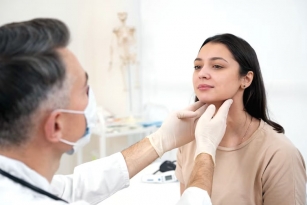
The Top 5 Cancers That Affect Women:- The diagnosis of cancer can often be linked directly to your family medical history, your lifestyle choices, and your environment.
You cannot control your family medical history, and only some aspects of your environment are up to you. But lifestyle choices like diet, weight, activity level, and smoking are yours to manage.
Most of the common types of cancer which affects women are mentioned below:
- Breast Cancer
- Lung And Bronchus Cancers
- Colon And Rectal Cancers
- Uterine Cancer
- Non-Hodgkin lymphoma
As you learn about the common risk factors for each of these cancers, you can take steps to correct the ones within your control.
I) The Risks Of Breast Cancer

Risk factors for breast cancer, the most common cancer among women, include:
- Age: Two of three women with invasive breast cancer are 55 or older.
- Family history: Your risk is doubled if your mother, sister, or daughter has had it.
- Race: Compared to African-Americans, White women are more susceptible, although African-American women are more likely to die from breast cancer, partly because their tumors may grow faster.
- Dense breast tissue
- Previous radiation treatment to the chest
- A greater than average number of menstrual periods (starting before age 12, reaching menopause after age 55)
- No pregnancies, or having your first pregnancy after the age of 30.
- Taking birth control pills: After stopping the pill, the level of risk goes back to normal 10 years.
- Past treatment with the drugs, once used to prevent miscarriage
- Post-menopausal hormone therapy: Avoiding this treatment decreases your risk of breast cancer.
- Not breastfeeding
- Being overweight and having a high-fat diet
- Lack of exercise
- Drinking heavily
II) The Risks Of Lung and Bronchus Cancer

If people do not smoke, 80% of all lung cancers in women (and 90% in men) might be avoided; smokers are 10 to 20 times more likely to get lung cancer than nonsmokers. Family history also plays a part. Other risk factors include exposure to:
- Second-hand smoke
- Radon gas
- Arsenic
- Tar
- Soot
Besides following an exercise plan and a healthy diet, limiting your alcohol intake can also help keep lung cancer at bay.
III) Risks Of Colon And Rectum Cancer

More than 90% of colon cancers occur in those 50 and older. Risk factors include:
- A personal or family history of colo-rectal cancer, polyps, or inflammatory bowel disease
- Inactivity
- Smoking
- Heavy drinking
- Low-fiber, high-fat diet that includes lots of processed meat and few fruits and vegetables
Early detection is a lifesaver, especially when it comes to colon and rectum cancers. For abnormal cells to grow in the colon, it usually takes 10 to 15 years, which implies if you have regular colonoscopy screenings to look for polyps and remove them before they become abnormal, you can stay on top of this deadly disease.
A new study also found a promising connection between calcium and dairy food intake and a lower risk of colon cancer.
IV) Risks Of Uterine Cancer

Hormonal changes, particularly related to estrogen, play a significant role in your risk for uterine cancer, also known as endometrial cancer. Risk factors include:
- A greater than average number of menstrual periods
- No pregnancies
- Taking estrogen therapy
- Obesity and having a high-fat diet
- Some kinds of ovarian tumors
- Polycystic ovarian syndrome
- Age
- Diabetes
- A family history of colon cancer
- Breast or ovarian cancer personal history
- Some cases of endometrial hyperplasia, a thickening of the uterine lining
Using birth control pills over a period of time, but ultimately having multiple pregnancies, can help decrease your risk.
V) Non-Hodgkins Lymphoma Risks

This disease, usually can arise in the lymph nodes, spleen, tonsils and adenoids, thymus gland, or bone marrow, attacks the body’s lymphatic system, which is part of the immune system. Risk factors include:
- A weakened immune system, especially if related to long-term infection or organ transplant
- Age: Most cases occur in people 60 or older
- Exposure to certain chemicals, especially insecticides and herbicides
- Obesity
- Autoimmune diseases
There are no known prevention methods for Non-Hodgkins lymphoma, other than to avoid diseases that cause immune deficiency; the most preventable of these diseases is HIV.
Improve your health and reduce your risk of cancers common to women by following all the lifestyle improvements you can, mostly simple changes to your diet and exercise habits.
SUPRAJA














